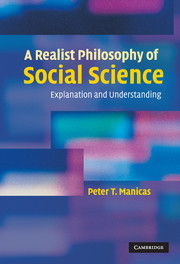Book contents
- Frontmatter
- Contents
- Acknowledgements
- Introduction
- 1 Explanation and understanding
- 2 Theory, experiment and the metaphysics of Laplace
- 3 Explanation and understanding in the social sciences
- 4 Agents and generative social mechanisms
- 5 Social science and history
- 6 Markets as social mechanisms
- Appendix A The limits of multiple regression
- Appendix B Comparison, Mill's methods and narrative
- Appendix C Rational choice theory and historical sociology
- Appendix D The neo-classical model
- References
- Index
5 - Social science and history
Published online by Cambridge University Press: 12 November 2009
- Frontmatter
- Contents
- Acknowledgements
- Introduction
- 1 Explanation and understanding
- 2 Theory, experiment and the metaphysics of Laplace
- 3 Explanation and understanding in the social sciences
- 4 Agents and generative social mechanisms
- 5 Social science and history
- 6 Markets as social mechanisms
- Appendix A The limits of multiple regression
- Appendix B Comparison, Mill's methods and narrative
- Appendix C Rational choice theory and historical sociology
- Appendix D The neo-classical model
- References
- Index
Summary
Introduction
One could argue that the classical sociologists, Montesquieu, Comte, de Tocqueville, Marx, Weber, even Durkheim, were historical sociologists. All of them worked with historical materials and all shared in the idea that this was essential to what they were doing. They did their work before sociology emerged in the twentieth century as a distinct discipline. Even though Marx disapproved of much work which had been done by people who identified themselves as historians, he believed, indeed, that history was the human science. Similarly, Weber seems to have believed that sociology was, as he put it, a propaedeutic for historical work. That is, sociology could provide the tools and concepts for good historical inquiry, but was not itself an independent body of knowledge.
Beginning in the so-called Methodenstreit (battle of methods) toward the end of the nineteenth century, the literature has tended to employ a distinction formulated by Windelband in 1894 between two kinds of inquiry: “nomothetic” versus “idiographic.” It is generally held that the natural sciences are nomothetic – they are engaged in the search of laws, while the human sciences, including history, are idiographic – their object of concern is the concrete particular in its uniqueness. But there is considerable disagreement as to whether the grounds for this difference are methodological, epistemological or ontological. In what is perhaps its most recurring form, two kinds of explanation are at issue: on the nomothetic view, explanation is in the form of the covering law model.
- Type
- Chapter
- Information
- A Realist Philosophy of Social ScienceExplanation and Understanding, pp. 103 - 125Publisher: Cambridge University PressPrint publication year: 2006

